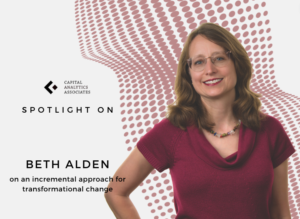 2 min read August 2023 — Beth Alden, executive director of the Hillsborough Transportation Planning Organization, talked with Invest: about the lack of funding for public transportation in the area. She discussed how a big concern is safety and repairing roads and bridges that have seen the most incidents. She also expressed that she is optimistic about grant opportunities and an incremental approach for transformational change.
2 min read August 2023 — Beth Alden, executive director of the Hillsborough Transportation Planning Organization, talked with Invest: about the lack of funding for public transportation in the area. She discussed how a big concern is safety and repairing roads and bridges that have seen the most incidents. She also expressed that she is optimistic about grant opportunities and an incremental approach for transformational change.
How do you expect TPO to navigate the current landscape, given the economic challenges?
We have seen construction prices escalate and that makes it more difficult to create cost-feasible transportation plans. It is particularly challenging in an environment that is already underfunded at a local level. The state of Florida has a gas tax that is indexed to inflation and so, to an extent, they can keep up with cost increases. That is not so true at the local level. We have gas taxes that don’t change and haven’t in decades. So, the real value has continued to fall. Meanwhile, costs have gone up 60% over the past five years. As a result, we aren’t able to cover the basics like fixing potholes and bridges on time. We had a very close referendum on a one-cent sales tax that would have addressed those bare necessities for transportation but it failed to pass.
How are you adapting to these challenges while there has been an influx of people coming to the region?
The influx of people places greater demand on the infrastructure that is already underfunded. There will be some new tax revenue coming from new residents. If they are building new homes, there is a one-time assessment that is meant to support building new roads and other infrastructure. It does not cover the cost of maintaining that infrastructure over time. This is where we have been falling behind for decades.
What are your thoughts on a regional metropolitan planning organization?
We have a very good working relationship among the counties, with staff meeting monthly and elected officials quarterly. There is a lot of collaboration in this region. There is interest in merging the transportation planning organizations in Hillsborough, Pinellas, and Pasco Counties because of the lack of progress on transportation improvements in the region. We are confusing the lack of funding with a lack of planning. There has been plenty of planning for how to improve transportation in the region, but the funding to build what is planned is very limited. There is a hope that if the planning organizations merge, we will be better able to advocate for state and federal grants. The federal bipartisan infrastructure law in 2021 was very ambitious and laid out a five-year plan with many new grant opportunities. I have been excited to see us win upward of $40 million through the Safe Streets for All grant program. We received the largest chunk of money in the country for construction projects because our governments have been working together for years on how to address the safety problems in the region, taking a data-driven approach and looking at severe crash areas. Also, the city of Tampa won $5 million through the Reconnecting Communities program, to transform the north end of Tampa’s Downtown. These are great, one-shot infusions. If we want to reach a point of being as safe as other areas, we need ongoing funding for safety improvements every year, on the order of around $45 million every year for 20 years.
What are some of the technological advances TPO has incorporated to ensure they are providing the best services for clients?
We are continuing to use big data analysis tools to target congestion in real time. That is the kind of traffic congestion data you would see on Google maps or Waze. There are data providers working with the state and using things like Bluetooth technology to track how fast traffic is moving, or where accidents are located. We need to be able to roll that data up so that we can compare it over a year, and over multiple years, and find problem areas. The better data we can get, the better we can improve those problem areas. Also, there are a lot of technologies out there now for automated vehicles. For the smart cars to work effectively, we need smart traffic signals that the cars can communicate with in real time. So again, we are back to public investment. The state of Florida is using state revenues to plan upgrades to traffic management systems on state highways. Local governments, county roads and city roads are competing for resources.
What is your outlook for the Tampa Bay transportation industry for the next three to five years?
Our best opportunities are chasing grants. All our agencies are focused on how we can move forward using competitive grant opportunities.
It is very exciting to see the reconstruction in Downtown Tampa and the transformation coming out of the ground. That is where we have been able to make a difference. Several grants have supported infrastructure to transform Downtown Tampa. For example, completing the Riverwalk. We are also hopeful about Brightline coming Downtown. The state has provided a grant to extend the streetcar further north. Right now, we must be ambitious in spots that are very targeted. If we can demonstrate what it would look like to transform our city in key areas, people will be excited and will want to see it happen in more places.
For more information, visit:
https://planhillsborough.org/transportation-planning-organization/
